新概念英语二册超详教案讲义笔记Lesson 70 Red for danger 危险的红色
文档属性
| 名称 | 新概念英语二册超详教案讲义笔记Lesson 70 Red for danger 危险的红色 | 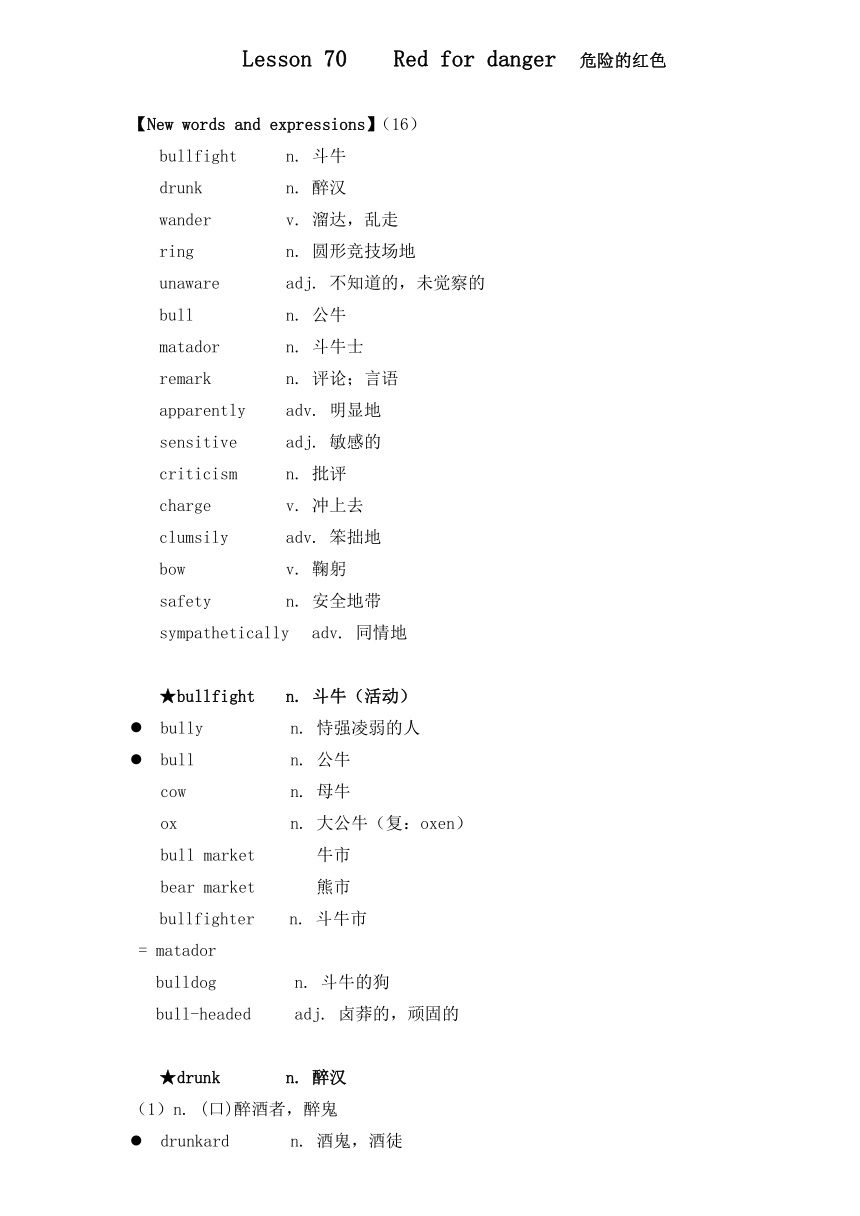 | |
| 格式 | docx | ||
| 文件大小 | 42.4KB | ||
| 资源类型 | 教案 | ||
| 版本资源 | 新概念英语 | ||
| 科目 | 英语 | ||
| 更新时间 | 2023-09-26 09:14:42 | ||
图片预览

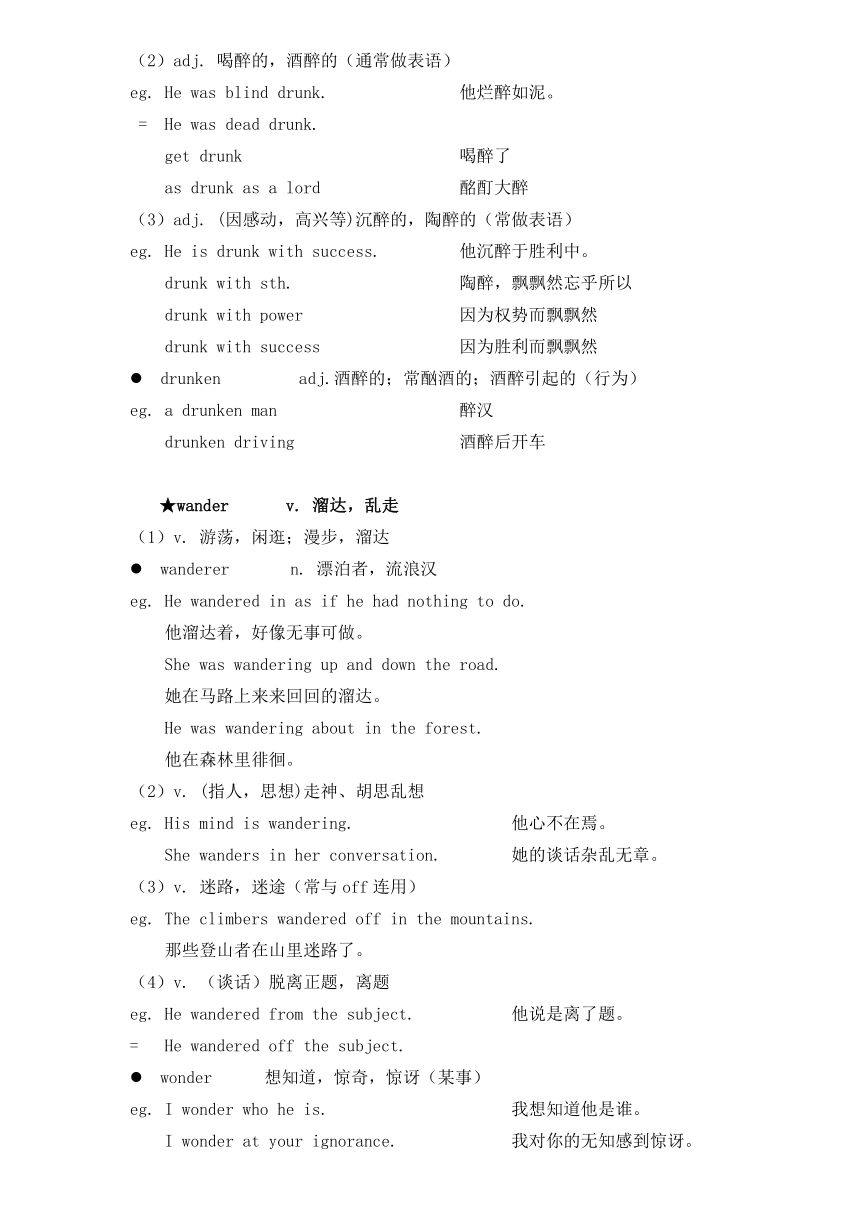
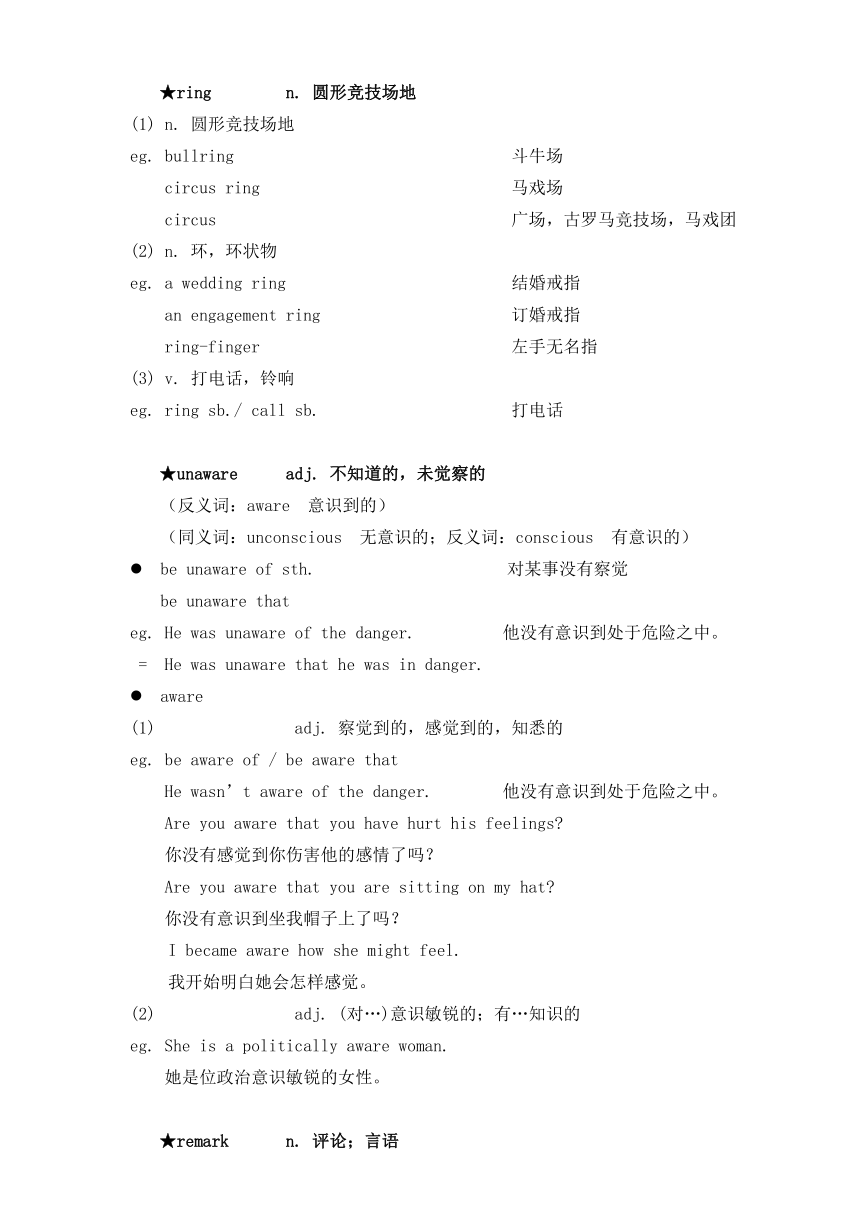
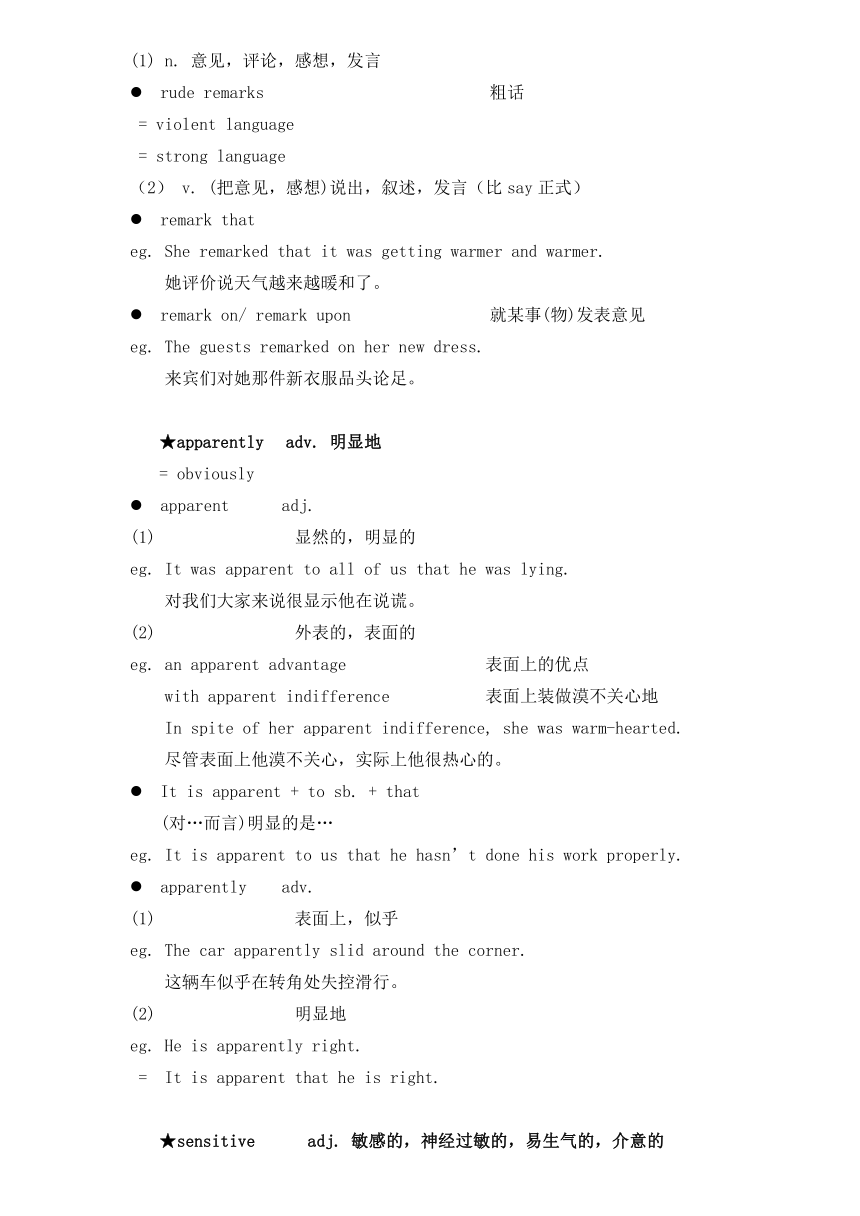
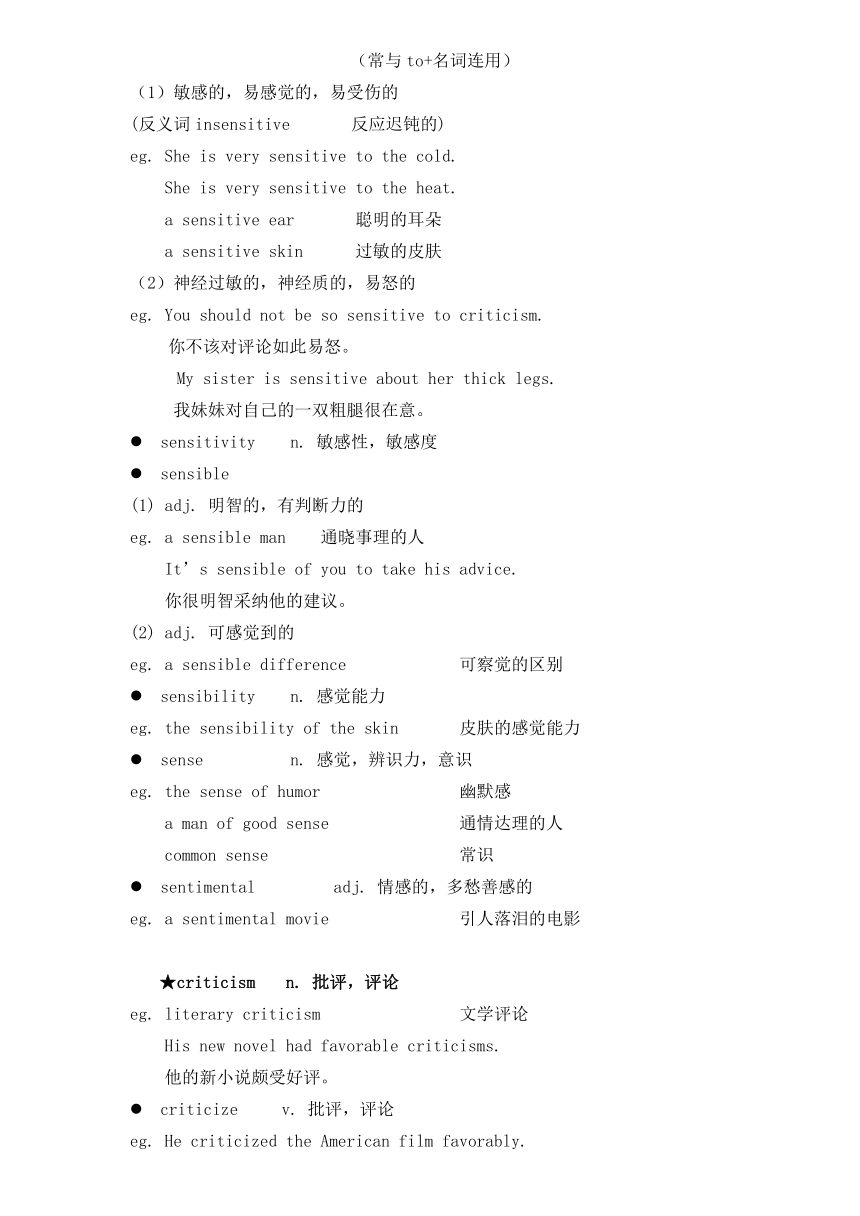
文档简介
Lesson 70 Red for danger 危险的红色
【New words and expressions】(16)
bullfight n. 斗牛
drunk n. 醉汉
wander v. 溜达,乱走
ring n. 圆形竞技场地
unaware adj. 不知道的,未觉察的
bull n. 公牛
matador n. 斗牛士
remark n. 评论;言语
apparently adv. 明显地
sensitive adj. 敏感的
criticism n. 批评
charge v. 冲上去
clumsily adv. 笨拙地
bow v. 鞠躬
safety n. 安全地带
sympathetically adv. 同情地
★bullfight n. 斗牛(活动)
bully n. 恃强凌弱的人
bull n. 公牛
cow n. 母牛
ox n. 大公牛(复:oxen)
bull market 牛市
bear market 熊市
bullfighter n. 斗牛市
= matador
bulldog n. 斗牛的狗
bull-headed adj. 卤莽的,顽固的
★drunk n. 醉汉
(1)n. (口)醉酒者,醉鬼
drunkard n. 酒鬼,酒徒
(2)adj. 喝醉的,酒醉的(通常做表语)
eg. He was blind drunk. 他烂醉如泥。
= He was dead drunk.
get drunk 喝醉了
as drunk as a lord 酩酊大醉
(3)adj. (因感动,高兴等)沉醉的,陶醉的(常做表语)
eg. He is drunk with success. 他沉醉于胜利中。
drunk with sth. 陶醉,飘飘然忘乎所以
drunk with power 因为权势而飘飘然
drunk with success 因为胜利而飘飘然
drunken adj.酒醉的;常酗酒的;酒醉引起的(行为)
eg. a drunken man 醉汉
drunken driving 酒醉后开车
★wander v. 溜达,乱走
(1)v. 游荡,闲逛;漫步,溜达
wanderer n. 漂泊者,流浪汉
eg. He wandered in as if he had nothing to do.
他溜达着,好像无事可做。
She was wandering up and down the road.
她在马路上来来回回的溜达。
He was wandering about in the forest.
他在森林里徘徊。
(2)v. (指人,思想)走神、胡思乱想
eg. His mind is wandering. 他心不在焉。
She wanders in her conversation. 她的谈话杂乱无章。
(3)v. 迷路,迷途(常与off连用)
eg. The climbers wandered off in the mountains.
那些登山者在山里迷路了。
(4)v. (谈话)脱离正题,离题
eg. He wandered from the subject. 他说是离了题。
= He wandered off the subject.
wonder 想知道,惊奇,惊讶(某事)
eg. I wonder who he is. 我想知道他是谁。
I wonder at your ignorance. 我对你的无知感到惊讶。
★ring n. 圆形竞技场地
(1) n. 圆形竞技场地
eg. bullring 斗牛场
circus ring 马戏场
circus 广场,古罗马竞技场,马戏团
(2) n. 环,环状物
eg. a wedding ring 结婚戒指
an engagement ring 订婚戒指
ring-finger 左手无名指
(3) v. 打电话,铃响
eg. ring sb./ call sb. 打电话
★unaware adj. 不知道的,未觉察的
(反义词:aware 意识到的)
(同义词:unconscious 无意识的;反义词:conscious 有意识的)
be unaware of sth. 对某事没有察觉
be unaware that
eg. He was unaware of the danger. 他没有意识到处于危险之中。
= He was unaware that he was in danger.
aware
adj. 察觉到的,感觉到的,知悉的
eg. be aware of / be aware that
He wasn’t aware of the danger. 他没有意识到处于危险之中。
Are you aware that you have hurt his feelings
你没有感觉到你伤害他的感情了吗?
Are you aware that you are sitting on my hat
你没有意识到坐我帽子上了吗?
I became aware how she might feel.
我开始明白她会怎样感觉。
adj. (对…)意识敏锐的;有…知识的
eg. She is a politically aware woman.
她是位政治意识敏锐的女性。
★remark n. 评论;言语
(1) n. 意见,评论,感想,发言
rude remarks 粗话
= violent language
= strong language
(2) v. (把意见,感想)说出,叙述,发言(比say正式)
remark that
eg. She remarked that it was getting warmer and warmer.
她评价说天气越来越暖和了。
remark on/ remark upon 就某事(物)发表意见
eg. The guests remarked on her new dress.
来宾们对她那件新衣服品头论足。
★apparently adv. 明显地
= obviously
apparent adj.
显然的,明显的
eg. It was apparent to all of us that he was lying.
对我们大家来说很显示他在说谎。
外表的,表面的
eg. an apparent advantage 表面上的优点
with apparent indifference 表面上装做漠不关心地
In spite of her apparent indifference, she was warm-hearted.
尽管表面上他漠不关心,实际上他很热心的。
It is apparent + to sb. + that
(对…而言)明显的是…
eg. It is apparent to us that he hasn’t done his work properly.
apparently adv.
表面上,似乎
eg. The car apparently slid around the corner.
这辆车似乎在转角处失控滑行。
明显地
eg. He is apparently right.
= It is apparent that he is right.
★sensitive adj. 敏感的,神经过敏的,易生气的,介意的
(常与to+名词连用)
(1)敏感的,易感觉的,易受伤的
(反义词insensitive 反应迟钝的)
eg. She is very sensitive to the cold.
She is very sensitive to the heat.
a sensitive ear 聪明的耳朵
a sensitive skin 过敏的皮肤
(2)神经过敏的,神经质的,易怒的
eg. You should not be so sensitive to criticism.
你不该对评论如此易怒。
My sister is sensitive about her thick legs.
我妹妹对自己的一双粗腿很在意。
sensitivity n. 敏感性,敏感度
sensible
adj. 明智的,有判断力的
eg. a sensible man 通晓事理的人
It’s sensible of you to take his advice.
你很明智采纳他的建议。
adj. 可感觉到的
eg. a sensible difference 可察觉的区别
sensibility n. 感觉能力
eg. the sensibility of the skin 皮肤的感觉能力
sense n. 感觉,辨识力,意识
eg. the sense of humor 幽默感
a man of good sense 通情达理的人
common sense 常识
sentimental adj. 情感的,多愁善感的
eg. a sentimental movie 引人落泪的电影
★criticism n. 批评,评论
eg. literary criticism 文学评论
His new novel had favorable criticisms.
他的新小说颇受好评。
criticize v. 批评,评论
eg. He criticized the American film favorably.
他对那部美国影片给予好评。
She’s always criticizing her friend for being selfish.
她总是批评她朋友自私。
critic n. (文学,美术,音乐等的)评论家,批评家
eg. a literary critic 文艺评论家
He is famous as an art critic. 他是著名的美术评论家。
critical adj.
批评的,批评性的
eg. a critical writer 评论家
a critical essay 评论
吹毛求疵的,喜爱挑剔的
eg. a critical reader 挑剔的读者
a critical attitude 挑剔的态度
be critical of sb. 对某人挑剔
危急的
eg. a critical situation 危急的状况
a matter of critical importance 非常重要的问题
We are at a critical time in our history.
我们处于历史上一个危急的时刻。
critically adv. 批评地,苛刻地
★charge v.冲上去
(1) vi. 冲
charge at
eg. The wounded lion suddenly charged at me.
受伤的狮子冲了过来。
The bull charged at the drunk.
公牛向醉汉冲了过去。
(2)v. 索价,要价
eg. He charged me 500 dollars for this dish.
这个菜他像我索要500美元。
(3)v. 控告
eg. charge with sb.
He was charged with murder. 他被控告谋杀。
(4)n. 照管,照料,负责
eg. be in charge of = take charge of
be in charge of the plan 负责一个计划
★clumsily adv. 笨拙地
eg. He painted a flower clumsily. 他笨手笨脚地画了一朵花。
clumsy adj. 笨手笨脚的
eg. a clumsy praise 笨拙的表扬
He is clumsy with using chopsticks. 他用筷子笨手笨脚地。
= He is clumsy at using chopsticks.
★bow v. 鞠躬
(1)v. 鞠躬,点头
bow sb. in 鞠躬迎入
bow sb. out 鞠躬送出
(2)n. 鞠躬
eg. He made a low bow. 他深鞠一躬。
make one’s bow (演员等)初次在观众前露面。
take a bow (演员)鞠躬谢幕。
(3)n. 蝴蝶结;射箭用的弓
arrow 箭
bow-leg 罗圈腿
(4)vt. 压弯,压倒
eg. My mother is bowed with age. 我母亲因年老而腰弯背驼。
The little tree is bowed with snow.
★safety n. 安全地带,安全
eg. safety first 安全第一
safety-belt 安全带
= seat- belt
safe
adj. 安全的(反义词: dangerous)
eg. Put your wallet in the safe place. 把你的钱包放在安全的地方。
It is safe + to do 做…是安全的
It is safe to swim in the river. 在这条河里游泳是安全的。
(2)adj. 平安的(多于come, arrive, return等动词连用)
eg. They arrived safe. 他们平安抵达。
★sympathetically adv. 同情地
sympathetic adj. 同情的
eg. sympathetic words 同情的话
be sympathetic to 对…表示同意
He was sympathetic to our proposal. 他对我们的建议表示同情。
sympathy
n. 同情,恻隐之心,怜悯
eg. send a letter of sympathy 寄一封慰问信
You have my sympathy 我很同情你。
n. 同意,共鸣,支持 (反义词:antipathy 憎恶)
eg. I have sympathy with his opinion. 我同意他的观点。
sympathize v. (对某人)同情,赞成
eg. I didn’t want you to sympathize with me.
我不想让你同情我。
sympathizer n. 同情者
【Text】
During a bullfight, a drunk suddenly wandered into the middle of the ring. The crowd began to shout, but the drunk was unaware of the danger. The bull was busy with the matador at the time, but it suddenly caught sight of the drunk who was shouting rude remarks and waving a red cap. Apparently sensitive to criticism, the bull forgot all about the matador and charged at the drunk. The crowd suddenly grew quiet. The drunk, however, seemed quite sure of himself. When the bull got close to him, he clumsily stepped aside to let it pass. The crowd broke into cheers and the drunk bowed. By this time, however, three men had come into the ring and they quickly dragged the drunk to safety. Even the bull seemed to feel sorry for him, for it looked on sympathetically until the drunk was out of the way before once more turning its attention to the matador.
参考译文
在一次斗牛时,一个醉汉突然溜达到斗牛场中间,人们开始大叫起来,但醉汉却没有意识到危险。当时那公牛正忙于对付斗牛士,但突然它看见了醉汉,只见他正大声说着粗鲁的话,手里挥动着一顶红帽子。对挑衅显然非常敏感的公牛完全撇开斗牛士,直奔醉汉而来。观众突然静了下来,可这醉汉像是很有把握似的。当公牛逼近他时,他踉跄地住旁边一闪,牛扑空了。观众欢呼起来,醉汉向人们鞠躬致谢。然而,此时已有3个人进入斗牛场,迅速把醉汉拉到安全的地方。好像连牛也在为他感到遗憾,因为它一直同情地看着醉汉,直到他的背影消逝,才重新将注意力转向斗牛士。
【课文讲解】
topic: Red for danger 危险的红色
eg. paint the town red (口)胡闹,出去狂欢痛饮
be in the red 亏空,负债
red tape 官样文章
1、During a bullfight, a drunk suddenly wandered into the middle of the ring. The crowd began to shout, but the drunk was unaware of the danger.
began to shout = began shouting 开始大叫起来
be unaware of… 不知道,没有觉察……
= be unconscious of…
eg. the drunk was unaware of the danger.
= the drunk was unconscious of the danger.
= the drunk was unconscious that he was in danger.
2、The bull was busy with the matador at the time, but it suddenly caught sight of the drunk who was shouting rude remarks and waving a red cap.
at the time = then = at that time 当时
catch sight of… 突然看到……
= begin to see
who was shouting rude remarks and waving a red cap 中who引导定语从句修饰drunk
3、Apparently sensitive to criticism, the bull forgot all about the matador and charged at the drunk.
apparently sensitive to criticism 很显然对挑衅非常敏感
= apparently (being) sensitive to criticism
(省略了being的现在分词短语,作原因状语)
forget all about 完全忘记
charge at … 冲过去
4、The crowd suddenly grew quiet. The drunk, however, seemed quite sure of himself.
grow quiet 变得安静
seem quite sure of 显得对…相当有把握
be/feel sure of oneself 有自信心
be sure of 对…有把握
be sure to do 一定做某事
eg. She’s always so sure of herself.
You are sure of a warm welcome when you come to China.
你来中国的时候一定能得到热烈的欢迎。
Be sure to come early next time.
下次一定早点来。
5、When the bull got close to him, he clumsily stepped aside to let it pass.
get close to sb. 靠近…,逼近…
step aside 站到一旁,让开,让位
step on 踩到
step in 走进
eg. That woman stepped on my foot, but didn’t apologize.
那位女士踩到我的脚了,但是没有道歉。
Step in , please. 请进。
step
n. 步调,步伐
eg. in step 步调一致
(反义词:out of step)
Watch your step! 小心脚下!当心!
n. (接近目标的)一步,一个阶段
eg. a step toward success 接近成功的一步
step by step 逐步地,一步一步地
n. 手段,措施
eg. take an unusual step 采取非常措施
n. 阶级,晋升
eg. get one’s step 升级
n. (楼梯,梯子的)梯级
eg. a door step 门阶
on the bottom step 在最后一阶
stepfather 继父
stepmother 继母
stepbrother 异父(母)兄弟
stepchild 丈夫与其前妻或妻子与其前夫所生的孩子
to let it pass 不定式作目的状语
let sb. do / let sth. do 让某人做某事/让某事怎么样
6、The crowd broke into cheers and the drunk bowed.
break into cheers 突然喝起彩来
break into…
(1)突然发出,突然……起来(不用被动语态)
eg. break into laughter 哄堂大笑
break into tears 嚎陶大哭
break into angry speech 突然吵了赶来
break into song 突然唱了起来
(2)闯入
eg. break out 爆发
Fire broke out in the neighborhood last night.
昨天晚上附近着火了。
break out crying 放声大哭
break out singing 突然唱了起来
break out laughing 哄堂大笑
break through 突破(障碍)
break up (关系)毁坏,破坏,中止
Their marriage broke up. 他们的婚姻破裂了。
What broke up their friendship 是什么破坏了他们的友谊?
7、By this time, however, three men had come into the ring and they quickly dragged the drunk to safety.
drag
v. 拖拽,拖动
eg. We dragged the carpet out of the room. 我们把毯子从房间拽了出去。
He dragged the table into the corner. 他把桌子拽到角落里。
v. (东西)在地上拖着
eg. The bride’s dress dragged along behind her.
新娘的礼服在身后拖在地上。
v. (强迫)硬拖(某人),拖人,拉进
drag + sb. +(副)in/into/out/out of
eg. She dragged her child out to the dentist’s.
她硬拖着孩子去看牙科医生。
The country was dragged into the war.
这个国家被拖进战争里。
drag one’s feet/drag one’s heels(脚后跟)
(口)故意拖延,拖着脚走
drag down 使(人)虚弱,把(人)拖挎
8、Even the bull seemed to feel sorry for him, for it looked on sympathetically until the drunk was out of the way before once more turning its attention to the matador.
look on 旁观,观看
looker-on 旁观者
out of
出去(反义词into)
eg. get out of a room
在…的范围外(反义词within, in)
eg. He lives a few miles out of the city. 他住在城外几英里处。
out of sight 看不见了
out of hearing 听不见了
失去,欠缺
eg. be out of film 胶卷用光了
be out of cash 现金用光了
be out of patience 不能忍受
be out of work 失业
(状态)从…离开
eg. out of fashion 过时了
out of control 失控
因为,由于
eg. out of kindness 出于好意
从(某个数)之中取出
eg. Choose one out of these ten. 从10个里取出1个。
turn one’s attention to 转移注意力
pay one’s attention to 注意某事物
【Key structures】
与for,with,of,to,at,from,in,on和about连用的形容词
与for连用的形容词:eager for(渴望),enough for(足够),famous for(以……而闻名),fit for(合适),grateful for/to(因……而感激),qualified for/in(能胜任),ready for/to(准备好),responsible for(对……负责),sorry for(对……感到遗憾),sufficient for(充足的),thankful for/to(感谢),valid for(有效期为……)
We have enough apples for the children.
They were eager for the performance to begin.
My aunt is famous for her beauty.
与with连用的形容词:angry with sb./at sth.(因某人或某事生气),busy with/at(忙于……),consistent with(与……一致),content with(对……满足),familiar with/to(与……熟悉),patient with(有耐心),popular with(为……所喜爱)
Why was Mary angry with you
She wasn’t content with her life.
Uncle Sam is always popular with children.
与of连用的形容词:afraid of(害怕),ahead of(在……前面),aware of(知道),capable of(能够),careful of/with(小心),certain of(确信),conscious of(意识到),envious of(妒忌),fond of(爱好),guilty of(有……罪的),ignorant of(不了解),independent of(独立于),jealous of(妒忌),kind of/to(对……和蔼),north/south/east/west of(在……的北/南/东/西面),short of(缺乏),shy of(顾虑),sure of(肯定),worthy of(值得)
She is careful his coming. 她注意衣着。
I was short of money at that time.
与to连用的形容词:close to(接近于),contrary to(与……相反),cruel to(对……残忍),dear to(对……很重要),equal to(与……相等),faithful to(忠于……),fatal to(对……是致命的),harmful to(对……有害的),identical to(与……相同的),indifferent to(对……不关心),inferior to(劣于……),liable to(对……有义务的),new to(对……没有经验),obedient to(对……服从),obvious to(对……清楚的),polite to(对……有礼貌),previous to(先于),rude to(对……粗暴无礼),sensitive to(对……敏感),similar to(与……相似),useful to(对……有用)
Most people are sensitive to criticism.
Though the bicycle is old, it is very dear to me. 虽然这辆自行车破旧,但我很珍视它。
All these words are new to me. 所有这些单词我都是第一次遇到。
It’s obvious to everyone that he’s lying. 大家都清楚他在撒谎。
My car is similar to yours. 我的车与你的车相似。
与at连用的形容词:bad at(不善于……),clever at(擅长),efficient at(能胜任的),expert at/in(能熟练做……),good at(善于),indignant at(对……感到愤慨),quick at(很快),sad at/about(因……而悲伤),slow at(对……迟钝),skillful at/in(熟练)
I am good/bad at swimming.
Tom is quick/slow at learning new things.
与from连用的形容词:away from(距……远的),different from(与……不同的),far from(远离),safe from(无危险的)
The man was far from comfortable while being confined to the wooden box.
那人被闷在木箱里时一点儿也不舒服。
与in连用的形容词:deficient in(缺少),fortunate from(在……很幸运),honest from(对……很诚实),weak from(在……薄弱的)
You’re fortunate in having a house of your own.
Frank is honest in business.
I’m weak in/at chemics.
与on连用的形容词:dependent on(依赖于……),intent on(专心于……),keen on(热心于……)
She was keen on tennis.
You shouldn’t be so intent on making money.
Are you still dependent on your father
与about连用的形容词:curious about(对……好奇的),doubtful about/of(对……有疑问),enthusiastic about(对……热心),reluctant about/to(勉强),right about/in(在……是正确的),uneasy about(对……感到不安)
She is uneasy about her future. 她为自己的前途担心。
I’m doubtful about/of his words.
【New words and expressions】(16)
bullfight n. 斗牛
drunk n. 醉汉
wander v. 溜达,乱走
ring n. 圆形竞技场地
unaware adj. 不知道的,未觉察的
bull n. 公牛
matador n. 斗牛士
remark n. 评论;言语
apparently adv. 明显地
sensitive adj. 敏感的
criticism n. 批评
charge v. 冲上去
clumsily adv. 笨拙地
bow v. 鞠躬
safety n. 安全地带
sympathetically adv. 同情地
★bullfight n. 斗牛(活动)
bully n. 恃强凌弱的人
bull n. 公牛
cow n. 母牛
ox n. 大公牛(复:oxen)
bull market 牛市
bear market 熊市
bullfighter n. 斗牛市
= matador
bulldog n. 斗牛的狗
bull-headed adj. 卤莽的,顽固的
★drunk n. 醉汉
(1)n. (口)醉酒者,醉鬼
drunkard n. 酒鬼,酒徒
(2)adj. 喝醉的,酒醉的(通常做表语)
eg. He was blind drunk. 他烂醉如泥。
= He was dead drunk.
get drunk 喝醉了
as drunk as a lord 酩酊大醉
(3)adj. (因感动,高兴等)沉醉的,陶醉的(常做表语)
eg. He is drunk with success. 他沉醉于胜利中。
drunk with sth. 陶醉,飘飘然忘乎所以
drunk with power 因为权势而飘飘然
drunk with success 因为胜利而飘飘然
drunken adj.酒醉的;常酗酒的;酒醉引起的(行为)
eg. a drunken man 醉汉
drunken driving 酒醉后开车
★wander v. 溜达,乱走
(1)v. 游荡,闲逛;漫步,溜达
wanderer n. 漂泊者,流浪汉
eg. He wandered in as if he had nothing to do.
他溜达着,好像无事可做。
She was wandering up and down the road.
她在马路上来来回回的溜达。
He was wandering about in the forest.
他在森林里徘徊。
(2)v. (指人,思想)走神、胡思乱想
eg. His mind is wandering. 他心不在焉。
She wanders in her conversation. 她的谈话杂乱无章。
(3)v. 迷路,迷途(常与off连用)
eg. The climbers wandered off in the mountains.
那些登山者在山里迷路了。
(4)v. (谈话)脱离正题,离题
eg. He wandered from the subject. 他说是离了题。
= He wandered off the subject.
wonder 想知道,惊奇,惊讶(某事)
eg. I wonder who he is. 我想知道他是谁。
I wonder at your ignorance. 我对你的无知感到惊讶。
★ring n. 圆形竞技场地
(1) n. 圆形竞技场地
eg. bullring 斗牛场
circus ring 马戏场
circus 广场,古罗马竞技场,马戏团
(2) n. 环,环状物
eg. a wedding ring 结婚戒指
an engagement ring 订婚戒指
ring-finger 左手无名指
(3) v. 打电话,铃响
eg. ring sb./ call sb. 打电话
★unaware adj. 不知道的,未觉察的
(反义词:aware 意识到的)
(同义词:unconscious 无意识的;反义词:conscious 有意识的)
be unaware of sth. 对某事没有察觉
be unaware that
eg. He was unaware of the danger. 他没有意识到处于危险之中。
= He was unaware that he was in danger.
aware
adj. 察觉到的,感觉到的,知悉的
eg. be aware of / be aware that
He wasn’t aware of the danger. 他没有意识到处于危险之中。
Are you aware that you have hurt his feelings
你没有感觉到你伤害他的感情了吗?
Are you aware that you are sitting on my hat
你没有意识到坐我帽子上了吗?
I became aware how she might feel.
我开始明白她会怎样感觉。
adj. (对…)意识敏锐的;有…知识的
eg. She is a politically aware woman.
她是位政治意识敏锐的女性。
★remark n. 评论;言语
(1) n. 意见,评论,感想,发言
rude remarks 粗话
= violent language
= strong language
(2) v. (把意见,感想)说出,叙述,发言(比say正式)
remark that
eg. She remarked that it was getting warmer and warmer.
她评价说天气越来越暖和了。
remark on/ remark upon 就某事(物)发表意见
eg. The guests remarked on her new dress.
来宾们对她那件新衣服品头论足。
★apparently adv. 明显地
= obviously
apparent adj.
显然的,明显的
eg. It was apparent to all of us that he was lying.
对我们大家来说很显示他在说谎。
外表的,表面的
eg. an apparent advantage 表面上的优点
with apparent indifference 表面上装做漠不关心地
In spite of her apparent indifference, she was warm-hearted.
尽管表面上他漠不关心,实际上他很热心的。
It is apparent + to sb. + that
(对…而言)明显的是…
eg. It is apparent to us that he hasn’t done his work properly.
apparently adv.
表面上,似乎
eg. The car apparently slid around the corner.
这辆车似乎在转角处失控滑行。
明显地
eg. He is apparently right.
= It is apparent that he is right.
★sensitive adj. 敏感的,神经过敏的,易生气的,介意的
(常与to+名词连用)
(1)敏感的,易感觉的,易受伤的
(反义词insensitive 反应迟钝的)
eg. She is very sensitive to the cold.
She is very sensitive to the heat.
a sensitive ear 聪明的耳朵
a sensitive skin 过敏的皮肤
(2)神经过敏的,神经质的,易怒的
eg. You should not be so sensitive to criticism.
你不该对评论如此易怒。
My sister is sensitive about her thick legs.
我妹妹对自己的一双粗腿很在意。
sensitivity n. 敏感性,敏感度
sensible
adj. 明智的,有判断力的
eg. a sensible man 通晓事理的人
It’s sensible of you to take his advice.
你很明智采纳他的建议。
adj. 可感觉到的
eg. a sensible difference 可察觉的区别
sensibility n. 感觉能力
eg. the sensibility of the skin 皮肤的感觉能力
sense n. 感觉,辨识力,意识
eg. the sense of humor 幽默感
a man of good sense 通情达理的人
common sense 常识
sentimental adj. 情感的,多愁善感的
eg. a sentimental movie 引人落泪的电影
★criticism n. 批评,评论
eg. literary criticism 文学评论
His new novel had favorable criticisms.
他的新小说颇受好评。
criticize v. 批评,评论
eg. He criticized the American film favorably.
他对那部美国影片给予好评。
She’s always criticizing her friend for being selfish.
她总是批评她朋友自私。
critic n. (文学,美术,音乐等的)评论家,批评家
eg. a literary critic 文艺评论家
He is famous as an art critic. 他是著名的美术评论家。
critical adj.
批评的,批评性的
eg. a critical writer 评论家
a critical essay 评论
吹毛求疵的,喜爱挑剔的
eg. a critical reader 挑剔的读者
a critical attitude 挑剔的态度
be critical of sb. 对某人挑剔
危急的
eg. a critical situation 危急的状况
a matter of critical importance 非常重要的问题
We are at a critical time in our history.
我们处于历史上一个危急的时刻。
critically adv. 批评地,苛刻地
★charge v.冲上去
(1) vi. 冲
charge at
eg. The wounded lion suddenly charged at me.
受伤的狮子冲了过来。
The bull charged at the drunk.
公牛向醉汉冲了过去。
(2)v. 索价,要价
eg. He charged me 500 dollars for this dish.
这个菜他像我索要500美元。
(3)v. 控告
eg. charge with sb.
He was charged with murder. 他被控告谋杀。
(4)n. 照管,照料,负责
eg. be in charge of = take charge of
be in charge of the plan 负责一个计划
★clumsily adv. 笨拙地
eg. He painted a flower clumsily. 他笨手笨脚地画了一朵花。
clumsy adj. 笨手笨脚的
eg. a clumsy praise 笨拙的表扬
He is clumsy with using chopsticks. 他用筷子笨手笨脚地。
= He is clumsy at using chopsticks.
★bow v. 鞠躬
(1)v. 鞠躬,点头
bow sb. in 鞠躬迎入
bow sb. out 鞠躬送出
(2)n. 鞠躬
eg. He made a low bow. 他深鞠一躬。
make one’s bow (演员等)初次在观众前露面。
take a bow (演员)鞠躬谢幕。
(3)n. 蝴蝶结;射箭用的弓
arrow 箭
bow-leg 罗圈腿
(4)vt. 压弯,压倒
eg. My mother is bowed with age. 我母亲因年老而腰弯背驼。
The little tree is bowed with snow.
★safety n. 安全地带,安全
eg. safety first 安全第一
safety-belt 安全带
= seat- belt
safe
adj. 安全的(反义词: dangerous)
eg. Put your wallet in the safe place. 把你的钱包放在安全的地方。
It is safe + to do 做…是安全的
It is safe to swim in the river. 在这条河里游泳是安全的。
(2)adj. 平安的(多于come, arrive, return等动词连用)
eg. They arrived safe. 他们平安抵达。
★sympathetically adv. 同情地
sympathetic adj. 同情的
eg. sympathetic words 同情的话
be sympathetic to 对…表示同意
He was sympathetic to our proposal. 他对我们的建议表示同情。
sympathy
n. 同情,恻隐之心,怜悯
eg. send a letter of sympathy 寄一封慰问信
You have my sympathy 我很同情你。
n. 同意,共鸣,支持 (反义词:antipathy 憎恶)
eg. I have sympathy with his opinion. 我同意他的观点。
sympathize v. (对某人)同情,赞成
eg. I didn’t want you to sympathize with me.
我不想让你同情我。
sympathizer n. 同情者
【Text】
During a bullfight, a drunk suddenly wandered into the middle of the ring. The crowd began to shout, but the drunk was unaware of the danger. The bull was busy with the matador at the time, but it suddenly caught sight of the drunk who was shouting rude remarks and waving a red cap. Apparently sensitive to criticism, the bull forgot all about the matador and charged at the drunk. The crowd suddenly grew quiet. The drunk, however, seemed quite sure of himself. When the bull got close to him, he clumsily stepped aside to let it pass. The crowd broke into cheers and the drunk bowed. By this time, however, three men had come into the ring and they quickly dragged the drunk to safety. Even the bull seemed to feel sorry for him, for it looked on sympathetically until the drunk was out of the way before once more turning its attention to the matador.
参考译文
在一次斗牛时,一个醉汉突然溜达到斗牛场中间,人们开始大叫起来,但醉汉却没有意识到危险。当时那公牛正忙于对付斗牛士,但突然它看见了醉汉,只见他正大声说着粗鲁的话,手里挥动着一顶红帽子。对挑衅显然非常敏感的公牛完全撇开斗牛士,直奔醉汉而来。观众突然静了下来,可这醉汉像是很有把握似的。当公牛逼近他时,他踉跄地住旁边一闪,牛扑空了。观众欢呼起来,醉汉向人们鞠躬致谢。然而,此时已有3个人进入斗牛场,迅速把醉汉拉到安全的地方。好像连牛也在为他感到遗憾,因为它一直同情地看着醉汉,直到他的背影消逝,才重新将注意力转向斗牛士。
【课文讲解】
topic: Red for danger 危险的红色
eg. paint the town red (口)胡闹,出去狂欢痛饮
be in the red 亏空,负债
red tape 官样文章
1、During a bullfight, a drunk suddenly wandered into the middle of the ring. The crowd began to shout, but the drunk was unaware of the danger.
began to shout = began shouting 开始大叫起来
be unaware of… 不知道,没有觉察……
= be unconscious of…
eg. the drunk was unaware of the danger.
= the drunk was unconscious of the danger.
= the drunk was unconscious that he was in danger.
2、The bull was busy with the matador at the time, but it suddenly caught sight of the drunk who was shouting rude remarks and waving a red cap.
at the time = then = at that time 当时
catch sight of… 突然看到……
= begin to see
who was shouting rude remarks and waving a red cap 中who引导定语从句修饰drunk
3、Apparently sensitive to criticism, the bull forgot all about the matador and charged at the drunk.
apparently sensitive to criticism 很显然对挑衅非常敏感
= apparently (being) sensitive to criticism
(省略了being的现在分词短语,作原因状语)
forget all about 完全忘记
charge at … 冲过去
4、The crowd suddenly grew quiet. The drunk, however, seemed quite sure of himself.
grow quiet 变得安静
seem quite sure of 显得对…相当有把握
be/feel sure of oneself 有自信心
be sure of 对…有把握
be sure to do 一定做某事
eg. She’s always so sure of herself.
You are sure of a warm welcome when you come to China.
你来中国的时候一定能得到热烈的欢迎。
Be sure to come early next time.
下次一定早点来。
5、When the bull got close to him, he clumsily stepped aside to let it pass.
get close to sb. 靠近…,逼近…
step aside 站到一旁,让开,让位
step on 踩到
step in 走进
eg. That woman stepped on my foot, but didn’t apologize.
那位女士踩到我的脚了,但是没有道歉。
Step in , please. 请进。
step
n. 步调,步伐
eg. in step 步调一致
(反义词:out of step)
Watch your step! 小心脚下!当心!
n. (接近目标的)一步,一个阶段
eg. a step toward success 接近成功的一步
step by step 逐步地,一步一步地
n. 手段,措施
eg. take an unusual step 采取非常措施
n. 阶级,晋升
eg. get one’s step 升级
n. (楼梯,梯子的)梯级
eg. a door step 门阶
on the bottom step 在最后一阶
stepfather 继父
stepmother 继母
stepbrother 异父(母)兄弟
stepchild 丈夫与其前妻或妻子与其前夫所生的孩子
to let it pass 不定式作目的状语
let sb. do / let sth. do 让某人做某事/让某事怎么样
6、The crowd broke into cheers and the drunk bowed.
break into cheers 突然喝起彩来
break into…
(1)突然发出,突然……起来(不用被动语态)
eg. break into laughter 哄堂大笑
break into tears 嚎陶大哭
break into angry speech 突然吵了赶来
break into song 突然唱了起来
(2)闯入
eg. break out 爆发
Fire broke out in the neighborhood last night.
昨天晚上附近着火了。
break out crying 放声大哭
break out singing 突然唱了起来
break out laughing 哄堂大笑
break through 突破(障碍)
break up (关系)毁坏,破坏,中止
Their marriage broke up. 他们的婚姻破裂了。
What broke up their friendship 是什么破坏了他们的友谊?
7、By this time, however, three men had come into the ring and they quickly dragged the drunk to safety.
drag
v. 拖拽,拖动
eg. We dragged the carpet out of the room. 我们把毯子从房间拽了出去。
He dragged the table into the corner. 他把桌子拽到角落里。
v. (东西)在地上拖着
eg. The bride’s dress dragged along behind her.
新娘的礼服在身后拖在地上。
v. (强迫)硬拖(某人),拖人,拉进
drag + sb. +(副)in/into/out/out of
eg. She dragged her child out to the dentist’s.
她硬拖着孩子去看牙科医生。
The country was dragged into the war.
这个国家被拖进战争里。
drag one’s feet/drag one’s heels(脚后跟)
(口)故意拖延,拖着脚走
drag down 使(人)虚弱,把(人)拖挎
8、Even the bull seemed to feel sorry for him, for it looked on sympathetically until the drunk was out of the way before once more turning its attention to the matador.
look on 旁观,观看
looker-on 旁观者
out of
出去(反义词into)
eg. get out of a room
在…的范围外(反义词within, in)
eg. He lives a few miles out of the city. 他住在城外几英里处。
out of sight 看不见了
out of hearing 听不见了
失去,欠缺
eg. be out of film 胶卷用光了
be out of cash 现金用光了
be out of patience 不能忍受
be out of work 失业
(状态)从…离开
eg. out of fashion 过时了
out of control 失控
因为,由于
eg. out of kindness 出于好意
从(某个数)之中取出
eg. Choose one out of these ten. 从10个里取出1个。
turn one’s attention to 转移注意力
pay one’s attention to 注意某事物
【Key structures】
与for,with,of,to,at,from,in,on和about连用的形容词
与for连用的形容词:eager for(渴望),enough for(足够),famous for(以……而闻名),fit for(合适),grateful for/to(因……而感激),qualified for/in(能胜任),ready for/to(准备好),responsible for(对……负责),sorry for(对……感到遗憾),sufficient for(充足的),thankful for/to(感谢),valid for(有效期为……)
We have enough apples for the children.
They were eager for the performance to begin.
My aunt is famous for her beauty.
与with连用的形容词:angry with sb./at sth.(因某人或某事生气),busy with/at(忙于……),consistent with(与……一致),content with(对……满足),familiar with/to(与……熟悉),patient with(有耐心),popular with(为……所喜爱)
Why was Mary angry with you
She wasn’t content with her life.
Uncle Sam is always popular with children.
与of连用的形容词:afraid of(害怕),ahead of(在……前面),aware of(知道),capable of(能够),careful of/with(小心),certain of(确信),conscious of(意识到),envious of(妒忌),fond of(爱好),guilty of(有……罪的),ignorant of(不了解),independent of(独立于),jealous of(妒忌),kind of/to(对……和蔼),north/south/east/west of(在……的北/南/东/西面),short of(缺乏),shy of(顾虑),sure of(肯定),worthy of(值得)
She is careful his coming. 她注意衣着。
I was short of money at that time.
与to连用的形容词:close to(接近于),contrary to(与……相反),cruel to(对……残忍),dear to(对……很重要),equal to(与……相等),faithful to(忠于……),fatal to(对……是致命的),harmful to(对……有害的),identical to(与……相同的),indifferent to(对……不关心),inferior to(劣于……),liable to(对……有义务的),new to(对……没有经验),obedient to(对……服从),obvious to(对……清楚的),polite to(对……有礼貌),previous to(先于),rude to(对……粗暴无礼),sensitive to(对……敏感),similar to(与……相似),useful to(对……有用)
Most people are sensitive to criticism.
Though the bicycle is old, it is very dear to me. 虽然这辆自行车破旧,但我很珍视它。
All these words are new to me. 所有这些单词我都是第一次遇到。
It’s obvious to everyone that he’s lying. 大家都清楚他在撒谎。
My car is similar to yours. 我的车与你的车相似。
与at连用的形容词:bad at(不善于……),clever at(擅长),efficient at(能胜任的),expert at/in(能熟练做……),good at(善于),indignant at(对……感到愤慨),quick at(很快),sad at/about(因……而悲伤),slow at(对……迟钝),skillful at/in(熟练)
I am good/bad at swimming.
Tom is quick/slow at learning new things.
与from连用的形容词:away from(距……远的),different from(与……不同的),far from(远离),safe from(无危险的)
The man was far from comfortable while being confined to the wooden box.
那人被闷在木箱里时一点儿也不舒服。
与in连用的形容词:deficient in(缺少),fortunate from(在……很幸运),honest from(对……很诚实),weak from(在……薄弱的)
You’re fortunate in having a house of your own.
Frank is honest in business.
I’m weak in/at chemics.
与on连用的形容词:dependent on(依赖于……),intent on(专心于……),keen on(热心于……)
She was keen on tennis.
You shouldn’t be so intent on making money.
Are you still dependent on your father
与about连用的形容词:curious about(对……好奇的),doubtful about/of(对……有疑问),enthusiastic about(对……热心),reluctant about/to(勉强),right about/in(在……是正确的),uneasy about(对……感到不安)
She is uneasy about her future. 她为自己的前途担心。
I’m doubtful about/of his words.
同课章节目录
